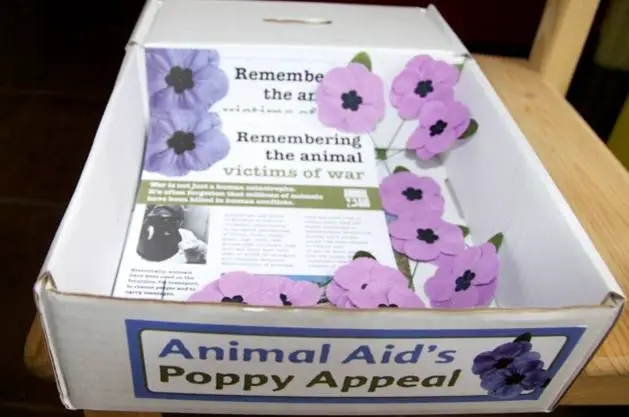Animals are forced to help humans fight bloody wars, whether the animals want to help or not. In this way, they can be considered victims of warfare.
Eight million horses died in World War I. Mules, donkeys, dogs, pigeons, elephants, camels, oxens, bullocks, cats, canaries, glow worms, and probably other species, too, have all been used for warfare by British, Commonwealth, and Allied forces in 20th century conflicts, and countless animal lives have been lost as a result. For more information on how these animals have specifically been used in warfare, please see Animals in War Memorial Fund's website, http://www.animalsinwar.org.uk/index.cfm?asset_id=1375.
From Animal Aid, here are some of the many ways animals have suffered in war:
"Collateral damage: Some of the most indelible images of the 1991 Gulf War showed the scorched and bloated bodies of camels abandoned in the shadow of burning oil wells. Photographer Steve McCurry describes ‘driving through the oilfields for several weeks after the hostilities ended and often [coming] across cattle, camels and horses wandering around like zombies. I guess most died eventually – all the water holes and vegetation were covered in oil‘. (Blood in the Sand, The Guardian newspaper, G2 section February 14, 2003).
Willful assaults: During the Serbian conflict – also in the early 1990s – bored or hyped-up soldiers amused themselves by taking shots at wild animals. Zoo inmates were starved, beaten, fired upon and even attacked with grenades.
The deserted ones: These include the farmed animals abandoned in their sheds or in fields once the shooting starts. And dogs, cats, fish, guinea pigs and birds left alone in people’s houses after those people take off to escape the mayhem. The animals starve and cry out for water, while the terrifying din of gunfire and explosions sound around them.
Front line victims: We can go back to the ancient Greeks and their use in pitched battles of Indian elephants – or consider the recent deployment of German Shepherd dogs, parachuted into Taliban strongholds in Afghanistan to search buildings for the enemy. A new generation of animal conscripts is even more expertly controlled and manipulated than those in the past – dolphins trained under extreme psychological and physical duress; and rats with gadgets implanted into their brains so that they can be directed, punished and rewarded at the tap of a keyboard.
Animals in weapons research: In Britain, most war-related vivisection is conducted by the Ministry of Defence in Porton Down, Wiltshire. Animals have been poisoned by chemical warfare agents, subjected to blast injuries, force-fed sensory irritants and deliberately wounded and killed by bacterial toxins. Porton scientists have described how monkeys, dosed with the nerve agent soman, became prostrate with violent convulsions, made attempts to crawl about the cage and then lost consciousness."
- Excerpt from "PREFACE FOR 'Animals and War: Confronting the Military-Animal Industrial Complex' (Lexington Press) - By Andrew Tyler, Director of Animal Aid" from http://www.animalaid.org.uk/h/n/NEWS/news_other//2974//
Animal Aid, the UK's largest animal rights group, provides purple poppies to be worn alongside red poppies on Remembrance Day. The purple poppy is a way to remember the animal victims of war. This year (2013), Animal Aid are unable to fulfill any more orders for poppies, but please buy one of their purple poppies in 2014 or later to show your support for the animals (or make your own purple poppy). Those in the UK may be able to find these poppies being sold in various UK shops. You can also purchase Animal Aid's Purple Poppy Car Sticker to raise awareness for this important issue. On Animal Aid's website, the organization lists other ways to get involved: http://www.animalaid.org.uk/h/n/CAMPAIGNS/living//2256//. (Please note that those living outside of the UK must purchase at least one non-poppy item along with the poppy items so that you can have your order placed.) (I only hope that the poppies aren't made of animal-derived felt!-- although I doubt that they would be, since Animal Aid is an animal rights group.)
Even if you don't wear any poppies, you can still take a moment to contemplate the human and animal cost of war this Remembrance Day.
 |
| Photo Courtesy of Animal Aid: http://www.animalaid.org.uk/h/n/CAMPAIGNS/living//2256// |
 |
| Photo Courtesy of On the Wight: http://onthewight.com/2012/11/05/purple-poppy-appeal-remembering-the-animal-victims-of-war/ |
Wow, I had no idea about a lot of what you have written here. Amazing research, and very informative. I have to read again...lots of info to think about.
ReplyDeleteThanks,
A.M.